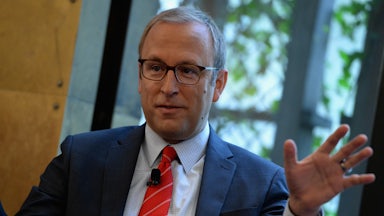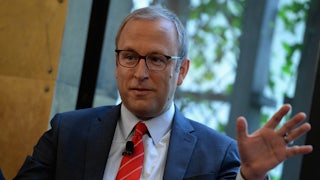Speaking to The Nation in 2014, Ehab Al Shihabi, then the CEO of the recently launched Al Jazeera America, made the case that Americans were desperate for serious, unbiased, old-fashioned hard news. “If we do the kind of reporting that is considered ‘back to the future’—the hardcore journalistic reporting, not biased, not for entertainment, but fact-based—do we have a place? All the research indicates yes,” he said. A year earlier, Shihabi suggested that there were as many as 50 million Americans seeking what Al Jazeera America had to offer.
But 50 million Americans didn’t tune in. The network’s prime-time audience instead numbered in the low five figures. That kind of serious hard news is expensive to produce. The network, as Slate’s Jordan Weissmann argued in 2016, had fallen for “a very seductive fiction” that Americans yearned for sober-minded reporting when, more often than not, they wanted junk: celebrity news, partisan conflict, people shouting at each other, 24 hours a day. Three years after launching, Al Jazeera America shut down.
On Tuesday, Al Jazeera announced that it was dipping its toe back into the American media market. Al Jazeera America was expensive—its journalism was slick and well produced, and the network also paid $500 million for Al Gore’s little-watched Current TV. Its new venture, in contrast, would be much more modest. Rightly, launching on Thursday, is a digital platform, which will begin with only one program. While its predecessor was widely perceived to appeal to American liberals, Rightly is aimed at center-right Republicans who “feel left out of mainstream media.”
The logic of Rightly is obvious. In the wake of Donald Trump’s loss in the 2020 presidential election, the right-wing news media has raced even further right. Viewers disgusted with Fox News’ tepid acknowledgment that Biden’s win was decisive and legitimate turned to upstarts like Newsmax and One America News Network, whose ratings have soared. Fox News has responded by attempting to outflank its new competitors. The war in the fever swamps suggests that, in theory, there’s an audience of center-right viewers desperate to find news coverage that affirms their worldview. But Al Jazeera has, once again, gotten its audience wrong.
For one thing, there is almost certainly no more overrepresented group in media, at least in relation to the population, than center-right conservatives. They are all over the op-ed pages of The New York Times, USA Today, The Wall Street Journal, The Washington Post, and countless other newspapers. People like David French, Jonah Goldberg, and George Will appear regularly on Sunday show panels and cable news. Even as Fox has abandoned the center-right, MSNBC and CNN have filled their programming with anti-Trump Republicans bemoaning the party’s retreat from the mainstream.
Initially founded as anti-Trump publications, The Bulwark and The Dispatch have appeared to fill the void left by The Weekly Standard and built audiences that have so far stayed with them into the post-Trump era. Reason magazine still exists. For those concerned about the excesses of the left, there is Persuasion and roughly 10,000 Substacks.
There is seemingly a bottomless appetite for conservative representation in media, even when the conservatives don’t actually represent a bloc of voters anymore. Conservative opinion programming often serves existing ends—the donors who fund Reason and The Federalist do so for ideological reasons. But opinion programming can also be astonishingly lucrative, partly because it’s so cheap to produce. The success of websites like Ben Shapiro’s appallingly bad The Daily Wire, which regularly posts fake news, attests to the efficacy of this model and its potency when mixed with social media platforms, particularly Facebook.
The center-right has held onto—and possibly actually grown—its representation in American media even as its political power has evaporated. A huge majority of Republicans—70 percent!—say they would vote for a primary challenger against any member of the GOP who voted for Trump’s impeachment. The audience built by the upstarts on the anti-Trump right (particularly the since-disgraced Lincoln Project) seems largely to draw from liberals responding to attacks on the forty-fifth president rather than any widespread affinity for conservative principles. Trump remains absurdly popular with people who describe themselves as conservative, even after the Capitol riots; the Republican Party itself has largely stopped giving even lip service to liberal principles.
Rightly’s first show, Right Now, is a modest entry into a familiar mode. “This show is a forum about the fight within the right over its commitment to liberalism, the ethic of accommodation, and openness,” host Stephen Kent, who is best known for hosting a podcast about Star Wars and politics, told NPR. “That tradition is under attack on the left and right. But I can’t settle the left’s increasingly complicated relationship with liberalism. So my focus will be on the right and building the case over time for why the liberal tradition is worth defending.” It’s not exactly the kind of thing you can imagine competing with Tucker Carlson, though that may very well be the point. Rightly isn’t trying to make an Al Jazeera America–size splash—it is, instead, a drop in the bucket.








